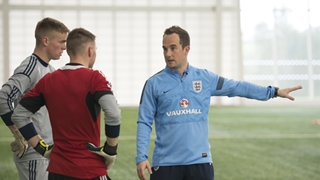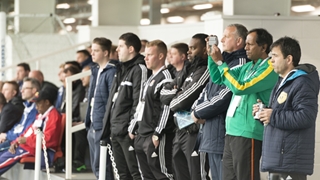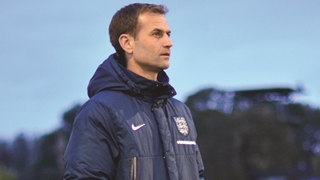
This week, Jack Robinson, England’s new U15-U17s national goalkeeper coach, delivered two practices at the 2016 FA Goalkeeper Conference at St.George’s Park.
Robinson, who recently joined The FA after working at Manchester United’s academy, focused on the techniques, skills and decisions required of young goalkeepers during the transitional element of the game.
However, the former Leeds United and Crystal Palace coach, believes that irrespective of the practice design or activities, it is the relationship between the goalkeeper and goalkeeper coach that is the most significant part of the coaching process. Particularly, when working with young players.
“It is important that you get the environment right within the practice. You can set up mannequins and cones but I think it is the attitude of the coach and the relationship with the player that is crucial,” explained Robinson.
“The players must trust you enough to believe in what you are saying and then be willing to go out and try it. You can only do that by listening to what they say but also understanding what they say,” added Robinson, in an interview with The Boot Room magazine in August 2014.
Robinson believes that working with young goalkeepers requires a long-term outlook, with the role of the goalkeeper coach to give individuals the confidence to make small steps along the way.
“Working with young goalkeepers is part of a long-term process,” stressed Robinson.
“I see it as an opportunity to work with them on little things through those age groups [5-11; 12-16]. Take dealing with crosses for example: I’ll start with trying to change their attitude and encouraging the idea to come and deal with things.
“As soon as they have developed the attitude to come for crosses then you start working on technique and then you work on positioning,” he added.
In the same way that outfield coaches are encouraged to manage mistakes to the players advantage Robinson has stressed the importance of creating a ‘no fear of failure’ environment for those youngsters charged with defending the goal.
“When we are working on crossing, some goalkeepers will worry about coming for a cross in case they drop it and concede. So it is important to take away the fear of a mistake.
“During practice you want to develop an attitude where young goalkeepers are willing to come for crosses and know it is ok if they come for a cross and miss it. In the training sessions I put on we will always have an environment where they have that ability to come and try things and to come and explore and create.
“Working on attitude, willingness and bravery during the younger ages is crucial and provides a foundation which allows you to tailor your approach as you progress through the age-groups,” added Robinson.










